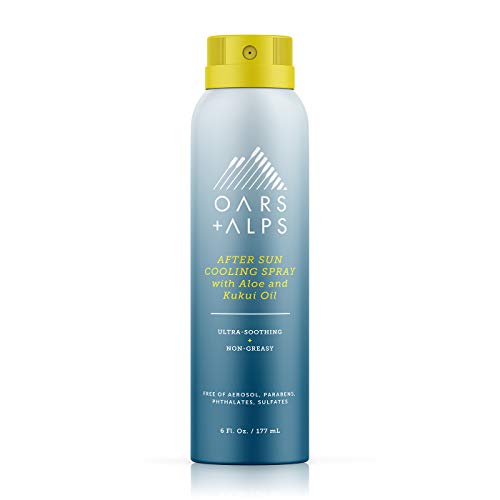
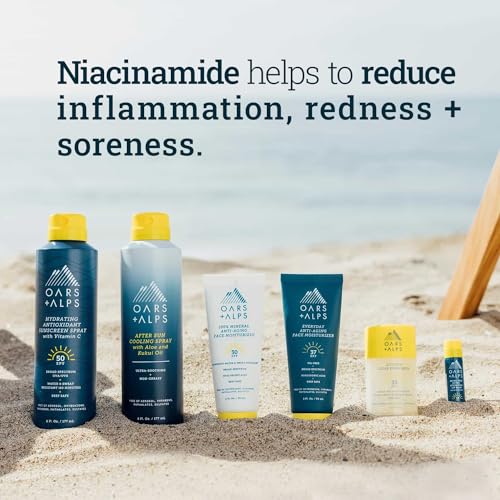

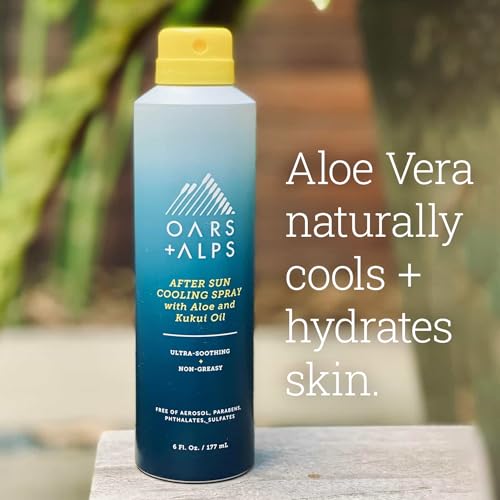
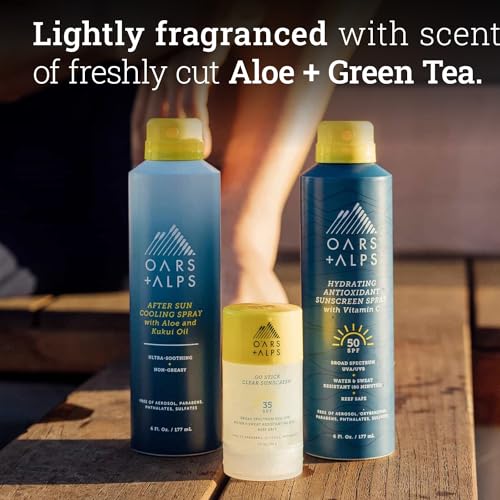
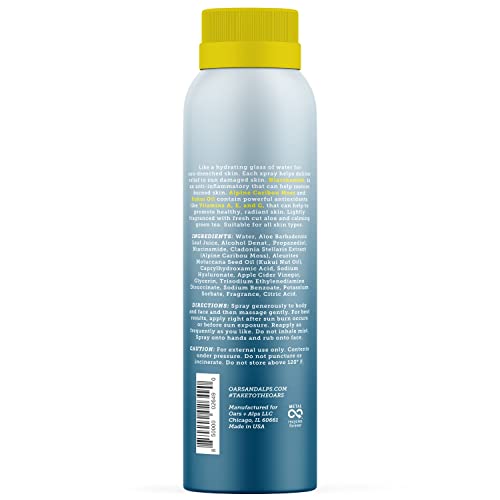

Oars + Alps After Sun Cooling Spray - Hydrates & Soothes Burned Skin, Green Tea Scent - 6 Fl Oz


Fragrance
High RiskFragrance refers to a mixture of aromatic compounds used in products to provide scent. It is commonly listed as 'fragrance' or 'parfum' on product labels and can serve various functions, including enhancing user experience and masking undesirable odors.
Sustai Insights
Fragrance offers functional benefits by improving product appeal; however, it poses significant health risks, notably a high likelihood of causing allergies and allergic contact dermatitis. Environmental risks include potential pollution and endocrine disruption, though its overall carcinogenicity is low. Regulatory bodies have noted concerns regarding its use, leading to a high-risk classification. Safe usage practices should be observed, and alternatives such as natural essential oils are recommended for those sensitive to synthetic fragrances.
Potassium Sorbate
Medium RiskPotassium sorbate is a potassium salt of sorbic acid, primarily used as a preservative in food and cosmetic products. It inhibits the growth of molds, yeast, and some bacteria, extending the shelf life of products. It is commonly found in various formulations due to its effectiveness and low toxicity.
Sustai Insights
Potassium sorbate serves as an effective preservative, preventing microbial growth in food and cosmetic products, which is vital for safety and longevity. Although it has a low risk of carcinogenicity and developmental toxicity, there is a moderate concern regarding allergies and immunotoxicity. Environmentally, it poses minimal risks as it is not significantly bioaccumulative. Regulatory agencies have verified its use, although some products may face restrictions. Overall, it is assessed as a medium risk ingredient, with safe usage practices recommended, and alternatives such as natural preservatives could be considered.
Sodium Benzoate
Medium RiskSodium benzoate is a preservative commonly used in food and cosmetic products to prevent microbial growth and extend shelf life. It is derived from benzoic acid and is effective at low concentrations, often used in acidic environments like beverages and condiments.
Sustai Insights
Sodium benzoate serves effectively as a preservative, contributing to product stability and safety. It is generally recognized as safe with low concerns for carcinogenicity, allergies, and reproductive toxicity, though it faces moderate use restrictions in some regions. Environmental risks include its potential as a pollutant, but it does not bioaccumulate significantly. Regulatory bodies have issued advisories regarding its concentration in products. Overall, the risk level is assessed as medium, with safe usage practices recommended. Alternatives such as potassium sorbate may provide similar benefits with potentially lower restrictions.
Citric Acid
Medium RiskCitric acid is an alpha hydroxy acid used in personal care products primarily for its role as a pH adjuster and natural preservative. It occurs naturally in citrus fruits and is commonly utilized in various formulations for its chelating properties and mild exfoliation benefits.
Sustai Insights
Citric acid offers functional benefits as an effective preservative and pH stabilizer, contributing to product longevity and stability. It is biodegradable and derived from renewable sources. Health risks are low, with minimal concerns regarding carcinogenicity, allergies, and reproductive toxicity. However, moderate use restrictions exist due to potential irritation at high concentrations. Environmental risks are limited, as citric acid is not known to accumulate in ecosystems. Regulatory agencies have no significant advisories against its use. Overall, it is assessed as a medium-risk ingredient, with safe usage practices recommended and alternatives available.
Apple Cider Vinegar
Low RiskApple cider vinegar is a fermented liquid made from crushed apples and is commonly used in food for flavoring, as a preservative, and in cleaning products due to its antibacterial properties. It is widely recognized for its culinary applications and potential health benefits.
Sustai Insights
Apple cider vinegar serves effectively as a preservative and flavoring agent, with some sustainability benefits due to its biodegradable nature. Health risks are minimal, with low concerns for carcinogenicity, allergies, and reproductive toxicity. It poses low environmental risks and is not currently restricted by regulatory bodies. Overall, it is considered a low-risk ingredient. For those seeking alternatives, other vinegar types or natural preservatives may be appropriate.
Propanediol
Low RiskPropanediol is a glycol compound commonly used in cosmetic and personal care products as a solvent, humectant, and skin-conditioning agent. It serves to enhance the texture and moisture retention of formulations, contributing to overall product efficacy.
Sustai Insights
Propanediol offers functional benefits such as effective moisture retention and improved product application. It is considered low-risk in terms of health concerns, with minimal associations with carcinogenicity, allergies, or reproductive toxicity. Environmentally, it has low pollutant potential and is not bioaccumulative. Regulatory bodies have not placed restrictions on its use. Despite concerns regarding enhanced skin absorption and potential endocrine disruption, the overall assessment indicates low risk. Safe usage practices should be followed, and alternatives like glycerin or other plant-based humectants can be considered.
Sodium Acetylhyaluronate
Low RiskSodium acetylhyaluronate is a sodium salt derivative of hyaluronic acid, commonly used in cosmetic formulations for its hydrating properties. It functions primarily as a humectant, attracting moisture to the skin and helping to maintain hydration levels in various personal care products.
Sustai Insights
Sodium acetylhyaluronate is recognized for its effective moisture-retaining properties, enhancing skin hydration and improving product texture. It has low health risks, with negligible concerns regarding carcinogenicity, allergies, or reproductive toxicity. Environmentally, it poses minimal risks and is not associated with significant pollution or bioaccumulation. Regulatory assessments indicate no current restrictions. Overall, it is considered low risk, making it a favorable ingredient in cosmetic formulations.
Trisodium Ethylenediamine Disuccinate
Low RiskTrisodium ethylenediamine disuccinate is a chelating agent commonly used in various formulations to enhance product stability and effectiveness. It functions by binding metal ions, which can otherwise catalyze degradation reactions, thereby improving the longevity and performance of personal care and cleaning products.
Sustai Insights
Trisodium ethylenediamine disuccinate offers functional benefits as an effective chelating agent that helps stabilize formulations. Its health risks are low, with minimal concerns surrounding carcinogenicity, allergies, or reproductive toxicity. Environmentally, it poses low risk, not contributing significantly to pollution or bioaccumulation. Currently, it is not restricted by regulatory bodies. Overall, the ingredient is assessed as low risk, making it a safe choice for various applications.
Niacinamide
Low RiskNiacinamide, also known as nicotinamide, is a form of vitamin B3 (niacin) that serves various functions in skincare and cosmetic products. It is often used for its potential benefits in improving skin texture, enhancing moisture retention, and supporting the skin's barrier function.
Sustai Insights
Niacinamide provides functional benefits such as enhancing skin hydration and improving the appearance of uneven skin tone. It is generally recognized as safe, with low concerns regarding carcinogenicity, allergies, or reproductive toxicity. However, enhanced skin absorption may pose risks for sensitive individuals. Regulatory bodies impose few restrictions on its use, and it is considered low risk overall. For safer alternatives, options like panthenol may be considered. Overall, niacinamide is a low-risk ingredient when used appropriately.
Vegetarian Glycerin
Low RiskVegetarian glycerin, also known as glycerol, is a colorless, odorless, and viscous liquid derived from plant sources. It is primarily used as a humectant, solvent, and emollient in various personal care products, helping to retain moisture and improve texture.
Sustai Insights
Vegetarian glycerin offers functional benefits as an effective humectant, promoting hydration and skin smoothness. It is biodegradable and typically sustainably sourced. Health risks associated with glycerin are low, with no significant concerns for carcinogenicity, allergens, or reproductive toxicity. Environmental risks are minimal, and it is not subject to major regulatory warnings. Overall, the risk level for this ingredient is low, making it a safe choice in formulations. Safe usage practices include ensuring proper concentrations in products, and alternatives such as propylene glycol exist but may have differing properties.
Water
Low RiskWater is a clear, colorless liquid essential for various biological processes. It serves as a solvent in formulations, facilitating the dissolution of other ingredients and enhancing product texture and application. Additionally, water plays a crucial role in hydration and is a key component in many cosmetic and personal care products.
Sustai Insights
Water is an effective solvent and hydrator, contributing to the texture and efficacy of formulations. It is biodegradable and generally regarded as safe, with low concerns regarding carcinogenicity, allergies, and reproductive toxicity. However, excessive water usage can lead to environmental concerns, particularly regarding resource depletion. Regulatory bodies do not impose restrictions on water use in cosmetics. Overall, the risks associated with water are low, making it a safe and essential ingredient.
Apple Cider Vinegar
Low RiskApple cider vinegar is a fermented liquid made from crushed apples and is commonly used in food for flavoring, as a preservative, and in cleaning products due to its antibacterial properties. It is widely recognized for its culinary applications and potential health benefits.
Sustai Insights
Apple cider vinegar serves effectively as a preservative and flavoring agent, with some sustainability benefits due to its biodegradable nature. Health risks are minimal, with low concerns for carcinogenicity, allergies, and reproductive toxicity. It poses low environmental risks and is not currently restricted by regulatory bodies. Overall, it is considered a low-risk ingredient. For those seeking alternatives, other vinegar types or natural preservatives may be appropriate.
Propanediol
Low RiskPropanediol is a glycol compound commonly used in cosmetic and personal care products as a solvent, humectant, and skin-conditioning agent. It serves to enhance the texture and moisture retention of formulations, contributing to overall product efficacy.
Sustai Insights
Propanediol offers functional benefits such as effective moisture retention and improved product application. It is considered low-risk in terms of health concerns, with minimal associations with carcinogenicity, allergies, or reproductive toxicity. Environmentally, it has low pollutant potential and is not bioaccumulative. Regulatory bodies have not placed restrictions on its use. Despite concerns regarding enhanced skin absorption and potential endocrine disruption, the overall assessment indicates low risk. Safe usage practices should be followed, and alternatives like glycerin or other plant-based humectants can be considered.
Sodium Acetylhyaluronate
Low RiskSodium acetylhyaluronate is a sodium salt derivative of hyaluronic acid, commonly used in cosmetic formulations for its hydrating properties. It functions primarily as a humectant, attracting moisture to the skin and helping to maintain hydration levels in various personal care products.
Sustai Insights
Sodium acetylhyaluronate is recognized for its effective moisture-retaining properties, enhancing skin hydration and improving product texture. It has low health risks, with negligible concerns regarding carcinogenicity, allergies, or reproductive toxicity. Environmentally, it poses minimal risks and is not associated with significant pollution or bioaccumulation. Regulatory assessments indicate no current restrictions. Overall, it is considered low risk, making it a favorable ingredient in cosmetic formulations.
Potassium Sorbate
Medium RiskPotassium sorbate is a potassium salt of sorbic acid, primarily used as a preservative in food and cosmetic products. It inhibits the growth of molds, yeast, and some bacteria, extending the shelf life of products. It is commonly found in various formulations due to its effectiveness and low toxicity.
Sustai Insights
Potassium sorbate serves as an effective preservative, preventing microbial growth in food and cosmetic products, which is vital for safety and longevity. Although it has a low risk of carcinogenicity and developmental toxicity, there is a moderate concern regarding allergies and immunotoxicity. Environmentally, it poses minimal risks as it is not significantly bioaccumulative. Regulatory agencies have verified its use, although some products may face restrictions. Overall, it is assessed as a medium risk ingredient, with safe usage practices recommended, and alternatives such as natural preservatives could be considered.
Trisodium Ethylenediamine Disuccinate
Low RiskTrisodium ethylenediamine disuccinate is a chelating agent commonly used in various formulations to enhance product stability and effectiveness. It functions by binding metal ions, which can otherwise catalyze degradation reactions, thereby improving the longevity and performance of personal care and cleaning products.
Sustai Insights
Trisodium ethylenediamine disuccinate offers functional benefits as an effective chelating agent that helps stabilize formulations. Its health risks are low, with minimal concerns surrounding carcinogenicity, allergies, or reproductive toxicity. Environmentally, it poses low risk, not contributing significantly to pollution or bioaccumulation. Currently, it is not restricted by regulatory bodies. Overall, the ingredient is assessed as low risk, making it a safe choice for various applications.
Fragrance
High RiskFragrance refers to a mixture of aromatic compounds used in products to provide scent. It is commonly listed as 'fragrance' or 'parfum' on product labels and can serve various functions, including enhancing user experience and masking undesirable odors.
Sustai Insights
Fragrance offers functional benefits by improving product appeal; however, it poses significant health risks, notably a high likelihood of causing allergies and allergic contact dermatitis. Environmental risks include potential pollution and endocrine disruption, though its overall carcinogenicity is low. Regulatory bodies have noted concerns regarding its use, leading to a high-risk classification. Safe usage practices should be observed, and alternatives such as natural essential oils are recommended for those sensitive to synthetic fragrances.
Sodium Benzoate
Medium RiskSodium benzoate is a preservative commonly used in food and cosmetic products to prevent microbial growth and extend shelf life. It is derived from benzoic acid and is effective at low concentrations, often used in acidic environments like beverages and condiments.
Sustai Insights
Sodium benzoate serves effectively as a preservative, contributing to product stability and safety. It is generally recognized as safe with low concerns for carcinogenicity, allergies, and reproductive toxicity, though it faces moderate use restrictions in some regions. Environmental risks include its potential as a pollutant, but it does not bioaccumulate significantly. Regulatory bodies have issued advisories regarding its concentration in products. Overall, the risk level is assessed as medium, with safe usage practices recommended. Alternatives such as potassium sorbate may provide similar benefits with potentially lower restrictions.
Niacinamide
Low RiskNiacinamide, also known as nicotinamide, is a form of vitamin B3 (niacin) that serves various functions in skincare and cosmetic products. It is often used for its potential benefits in improving skin texture, enhancing moisture retention, and supporting the skin's barrier function.
Sustai Insights
Niacinamide provides functional benefits such as enhancing skin hydration and improving the appearance of uneven skin tone. It is generally recognized as safe, with low concerns regarding carcinogenicity, allergies, or reproductive toxicity. However, enhanced skin absorption may pose risks for sensitive individuals. Regulatory bodies impose few restrictions on its use, and it is considered low risk overall. For safer alternatives, options like panthenol may be considered. Overall, niacinamide is a low-risk ingredient when used appropriately.
Vegetarian Glycerin
Low RiskVegetarian glycerin, also known as glycerol, is a colorless, odorless, and viscous liquid derived from plant sources. It is primarily used as a humectant, solvent, and emollient in various personal care products, helping to retain moisture and improve texture.
Sustai Insights
Vegetarian glycerin offers functional benefits as an effective humectant, promoting hydration and skin smoothness. It is biodegradable and typically sustainably sourced. Health risks associated with glycerin are low, with no significant concerns for carcinogenicity, allergens, or reproductive toxicity. Environmental risks are minimal, and it is not subject to major regulatory warnings. Overall, the risk level for this ingredient is low, making it a safe choice in formulations. Safe usage practices include ensuring proper concentrations in products, and alternatives such as propylene glycol exist but may have differing properties.
Citric Acid
Medium RiskCitric acid is an alpha hydroxy acid used in personal care products primarily for its role as a pH adjuster and natural preservative. It occurs naturally in citrus fruits and is commonly utilized in various formulations for its chelating properties and mild exfoliation benefits.
Sustai Insights
Citric acid offers functional benefits as an effective preservative and pH stabilizer, contributing to product longevity and stability. It is biodegradable and derived from renewable sources. Health risks are low, with minimal concerns regarding carcinogenicity, allergies, and reproductive toxicity. However, moderate use restrictions exist due to potential irritation at high concentrations. Environmental risks are limited, as citric acid is not known to accumulate in ecosystems. Regulatory agencies have no significant advisories against its use. Overall, it is assessed as a medium-risk ingredient, with safe usage practices recommended and alternatives available.
Water
Low RiskWater is a clear, colorless liquid essential for various biological processes. It serves as a solvent in formulations, facilitating the dissolution of other ingredients and enhancing product texture and application. Additionally, water plays a crucial role in hydration and is a key component in many cosmetic and personal care products.
Sustai Insights
Water is an effective solvent and hydrator, contributing to the texture and efficacy of formulations. It is biodegradable and generally regarded as safe, with low concerns regarding carcinogenicity, allergies, and reproductive toxicity. However, excessive water usage can lead to environmental concerns, particularly regarding resource depletion. Regulatory bodies do not impose restrictions on water use in cosmetics. Overall, the risks associated with water are low, making it a safe and essential ingredient.
Experience the soothing power of Oars + Alps After Sun Cooling Spray, designed to refresh sun-drenched skin with a blend of Aloe Vera and Niacinamide. This hydrating spray not only cools but also aids in skin repair, making it a must-have for outdoor enthusiasts.
- Cooling Relief: Instantly cools and hydrates sun-exposed skin, providing comfort like a refreshing drink after a hot day.
- Hydrating Ingredients: Enriched with Aloe Vera and Niacinamide, this spray is perfect for all skin types, helping to restore and soothe burned skin without the need for direct contact.
- Powerful Antioxidants: Kukui Oil and Alpine Caribou Moss deliver essential Vitamins A, C, and E, promoting natural skin healing post-sun exposure.
- Gentle and Eco-Friendly: Free from Parabens, Phthalates, and Sulfates, this vegan and cruelty-free formula comes in a recyclable, non-aerosol can, supporting both your skin and the planet.
- Calming Aroma: Lightly scented with fresh cut aloe and green tea, this spray offers a refreshing and calming experience, enhancing your post-sun care routine.
Subscribe & Save with Sustai
- Best Price Guarantee: Always enjoy the lowest prices on sustainable home essentials.
- No Surprises: We’ll notify you before shipping. No hidden fees, ever.
- You’re in Charge: Change, pause, or cancel your subscription anytime with ease.
- Eco-Friendly Deliveries: Our grouped shipments mean less packaging and lower emissions.
Join us on a sustainable journey. Special offers for a limited time! Prices and promotions may change.
Recommended Products
Experience the soothing power of Oars + Alps After Sun Cooling Spray, designed to refresh sun-drenched skin with a blend of Aloe Vera and Niacinamide. This hydrating spray not only cools but also aids in skin repair, making it a must-have for outdoor enthusiasts.
- Cooling Relief: Instantly cools and hydrates sun-exposed skin, providing comfort like a refreshing drink after a hot day.
- Hydrating Ingredients: Enriched with Aloe Vera and Niacinamide, this spray is perfect for all skin types, helping to restore and soothe burned skin without the need for direct contact.
- Powerful Antioxidants: Kukui Oil and Alpine Caribou Moss deliver essential Vitamins A, C, and E, promoting natural skin healing post-sun exposure.
- Gentle and Eco-Friendly: Free from Parabens, Phthalates, and Sulfates, this vegan and cruelty-free formula comes in a recyclable, non-aerosol can, supporting both your skin and the planet.
- Calming Aroma: Lightly scented with fresh cut aloe and green tea, this spray offers a refreshing and calming experience, enhancing your post-sun care routine.

You can have at most 2 Sustainable Steals products in your cart
Customer Reviews
Customers’ View
Customers appreciate the soothing and hydrating properties of the After Sun Spray, highlighting its effectiveness in relieving sunburn and providing instant cooling relief. Many users note the product's moisturizing benefits, with comments such as it feels comfortable on the skin and absorbs quickly without leaving a sticky residue. Additionally, the eco-friendly aspects, including being vegan and cruelty-free, resonate with health-conscious consumers. While some reviews express mixed feelings about the scent, overall sentiment emphasizes the product's functionality as a reliable after-sun care solution. Overall, customers find this product effective and aligned with their sustainable lifestyle.
AI-generated from the text of customer reviewsThis product is rated 5.0 of 5.0 stars.
It has received 4 reviews.




